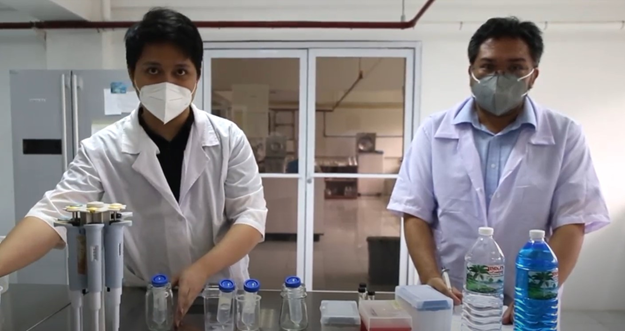News and Articles
Field-Test Kits for detection of methanol contamination in lambanog now on its development phase
Proper fermentation in the production of coconut wine, known locally as lambanog, is important to prevent poisoning, and the local experts reiterate the warnings to distillers over the drink’s high methanol content.
Last December 2019, 300 individuals were reportedly hospitalized in the provinces of Laguna and Quezon, with signs of poisoning, after drinking lambanog with high levels of methanol.
‘Lambanog poisoning is caused by residual methanol, which in high levels becomes highly toxic for humans. Methanol is naturally occurring substance present during the distilling process, that should be separated and removed thereafter’, DOH said in a statement released in the last quarter of 2019.
Due to this alarming situation, the Department of Science and Technology - CALABARZON, in partnership with Cavite State University (CvSU), is currently developing a field-test kits [for business owners] that can be used for internal quality control to ensure food quality and safety. The DOST funded this project with P1,074,900.00.
‘By taking samples and treating them, the observable change in its hue can help local brewers determine whether or not their products are safe for human consumption.’
Prototypes are very simple to use and affordable, but developers stressed that it needs more tests to prove its technical and economic feasibility.
To develop a low-cost field test kit (i.e., microfluidic paper-based colorimetric sensor) for detection of methanol contamination in alcoholic beverages, such as lambanog, and to help the producers establish food quality and safety standards, are the goal benefits of this technology.
Dr. Hosea Matel (right) of CvSu and Science Research Specialist Jon Uriel Layos of (left) DOST-SEI are shown working in the laboratory.
This initiative is led by its project leader, Dr. Hosea Matel of CvSu and DOST–Science Education Institute (DOST-SEI) Science Research Specialist, Jon Uriel Layos.
This initiative is led by its project leader, Dr. Hosea Matel of CvSu and DOST–Science Education Institute (DOST-SEI) Science Research Specialist, Jon Uriel Layos.
“The field-test kit for methanol is helpful in testing for food safety of lambanog; when deployed it can be integrated in the quality control procedures of distillers. This might be helpful in bringing back public trust on an age-old traditional product,” Dr. Matel said on a statement given to 2021 NSTW Promotions Team of DOST-Science and Technology Information Institute.
In these challenging times, science and technology always have an answer, the only way is to study and discover it.
This field-test kit is just one of those technologies that will be showcased in the upcoming virtual celebration of the 2021 National Science and Technology Week.
Participate in the celebration of NSTW from 22-28 November 2021 for free, and get to know more of the different technologies and innovations of Filipino scientists, researchers, and engineers in different fields of science!
The one-week celebration of science and technology carries the theme, ‘’Agham at Teknolohiya: Tugon sa Hamon ng Panahon’’, that will surely benefit participants by gaining valuable knowledge from the different activities of the various DOST agencies.
For more information, visit the NSTW website at http://nstw.dost.gov.ph/.
You can also check and follow the NSTW Facebook page at https://web.facebook.com/nstwdost to be updated.
FEATURED NEWS
17 NOV 2022
Sec. Solidum banners local technologies and innovations in the 2022 NSTW hybrid celebration21 OCT 2022
DOST showcases fishery, agro-forestry, ecotourism technologies during Caraga science fair
CONTACT US
Science and Technology Information Institute (STII)
Technology Application and Promotion Institute (TAPI)
(02) 837-2071 loc.2162
nstw.secretariat@gmail.com
(02) 837-2071 local 2148
nstwpromotions@gmail.com
